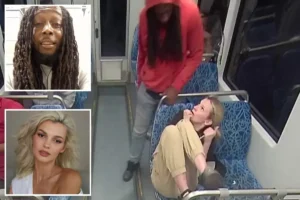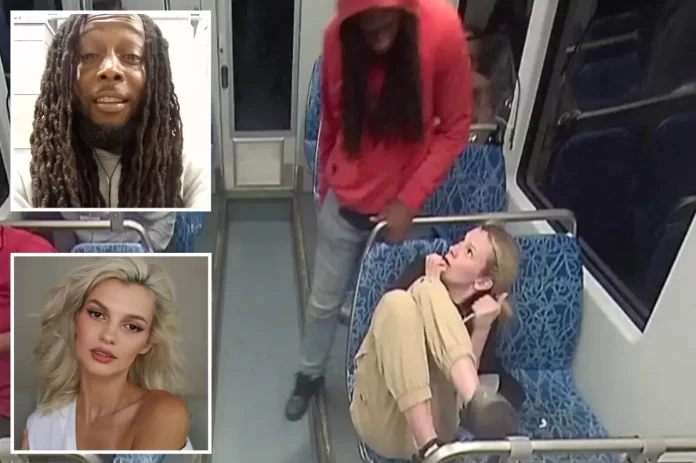Details Emerge: Heartbreaking Message and Smudged Heart Discovered Inside Iryna Zarutska's Folded Train Ticket
In a development that has deepened the sorrow surrounding the tragic death of 23-year-old Ukrainian refugee Iryna Zarutska, new details have emerged about a personal item returned to her family by police. The folded train ticket, retrieved from Zarutska's pocket following the fatal stabbing on a Charlotte light rail train, concealed a smudged heart drawing and a poignant message that has left her loved ones in even greater anguish. This intimate discovery, shared exclusively with select media outlets, offers a glimpse into Zarutska's hopeful spirit just moments before her life was brutally cut short, amplifying calls for justice and systemic change.

Iryna Zarutska's journey from war-torn Ukraine to the United States was one of determination and optimism. Born on May 22, 2002, in Kyiv, she pursued a degree in art restoration at Synergy College before the Russian invasion in 2022 forced her family to flee. Accompanied by her mother Anna, sister Valeriia, and brother Bohdan, Zarutska arrived in North Carolina, leaving her father Stanislav behind due to Ukraine's restrictions on men of military age. Settling in Huntersville, she embraced her new life with enthusiasm, working various jobs, learning English, and enrolling at Rowan-Cabarrus Community College. Described as an artist with a “heart of gold,” she shared her creativity through gifts of artwork and cared deeply for animals, dreaming of becoming a veterinary assistant. Her radiant smile and kindness endeared her to neighbors and colleagues alike, as she walked pets and contributed to her community.
Tragedy struck on August 22, 2025, around 9:45 p.m., as Zarutska boarded the LYNX Blue Line in Charlotte's South End after finishing a shift at Zepeddie’s Pizzeria. Surveillance footage captured the harrowing scene: Zarutska, still in her work uniform, sat in front of 34-year-old Decarlos Brown Jr., a homeless man with a history of arrests including robbery, breaking and entering, and mental health issues. Without provocation, Brown pulled a knife from his pocket and stabbed her multiple times. Despite efforts by passengers to aid her, Zarutska succumbed to her injuries at the scene. Brown, who did not have a valid ticket, was arrested shortly after and charged with first-degree murder, later facing federal charges as well. The graphic video of the attack, released publicly, has sparked widespread outrage, with her family pleading for it not to be shared out of respect for her dignity.
As investigations progressed, police returned personal effects to Zarutska's family, including the fateful train ticket from her pocket. Folded neatly, it appeared innocuous at first. But upon unfolding it, the family discovered a hand-drawn heart, smudged as if from hurried fingers, accompanied by a message in Zarutska's handwriting: “To my love: Every day with you feels like a new beginning. I escaped the darkness to find light in your arms. Forever grateful for our safe haven. With all my heart, Iryna.” The ink was slightly blurred, possibly from the chaos of the attack or tears, adding to the emotional weight. This note, believed to have been written earlier that day to her partner—who had been giving her driving lessons and with whom she recently moved in—reveals the depth of her affection and hope for a future in America.
The discovery has been described by a family spokesperson as “devastatingly beautiful and heartbreaking.” “Iryna poured her soul into that message, symbolizing her journey from the bombs of Ukraine to what she thought was safety here,” the spokesperson said. “The smudged heart mirrors the stains of violence that ended her dreams. We're shattered, but this reminds us of her loving spirit.” Zarutska's uncle, speaking out for the first time about this detail, echoed the sentiment: “She didn't deserve this. That ticket was her way home, but it became her final words of love.” The family, already vocal about their grief, has used this revelation to renew demands for accountability. “Iryna came here to find peace and safety, and instead her life was stolen,” they stated previously, now emphasizing how such personal losses underscore failures in public transit security and criminal justice.
The incident has ignited a national debate on urban safety, immigration, and policy reforms. Charlotte Mayor Vi Lyles expressed heartbreak, promising enhanced security on the LYNX Blue Line, including more officers, stricter fare enforcement, and improved monitoring. “This was a senseless and tragic loss,” she said. Political figures, including former President Donald Trump, have seized on the case, with Trump vowing to “avenge” Zarutska's death and criticizing “soft-on-crime” policies in Democratic-led cities. Attorney General Pam Bondi has pledged the harshest possible sentence for Brown, calling the murder a result of failed systems that prioritize criminals over innocents. Commentators like Charlie Kirk highlighted it as emblematic of broader issues, though his own recent passing has added a somber note to the discourse.

Social media has been flooded with tributes, amplifying Zarutska's story. Friends shared videos of her enjoying life, captioning them “forever young,” while her pizzeria posted: “We lost not only an incredible employee, but a true friend. A candle remains lit for the warmth she brought.” The “Oprah of Ukraine,” Dr. Natalia Kholodenko, a fellow refugee and trauma expert, addressed the family: “This pain is for all life, but every pain can become material for the biggest things—to support other families.” In Ukrainian, she added: “We Ukrainian women care, Ukrainian families care.” An online obituary paints her as a vibrant soul: “She shared her creativity generously… always with her radiant smile.”
Connecting to previous mysteries, this ticket's message contrasts with the eerie Polaroid photo discovered while cleaning her room—a snapshot showing Zarutska with friends and an unexplained shadowy figure. That image sparked paranormal speculation, but the ticket grounds the narrative in raw emotion. Together, they humanize Zarutska, turning her from a statistic into a symbol of lost potential. Forensic analysis of the ticket confirmed the handwriting as hers, with no signs of tampering, ruling out hoaxes.
As Brown's trial looms, the family focuses on legacy. They've called on U.S. Attorney Russ Ferguson and the FBI for a thorough probe, hoping to prevent similar tragedies. A legacy portrait, compositing her images onto an artistic backdrop, circulates online, celebrating her spirit. “This is not how life is supposed to be. A young life, full of hope,” one tribute reads. Zarutska's message endures as a testament to love amid adversity, urging society to honor her by fostering true safety for refugees and all.
The smudged heart and words inside that ticket encapsulate a life interrupted—hope folded into tragedy. As her family grieves, the world watches, demanding change so others may find the peace she sought.
